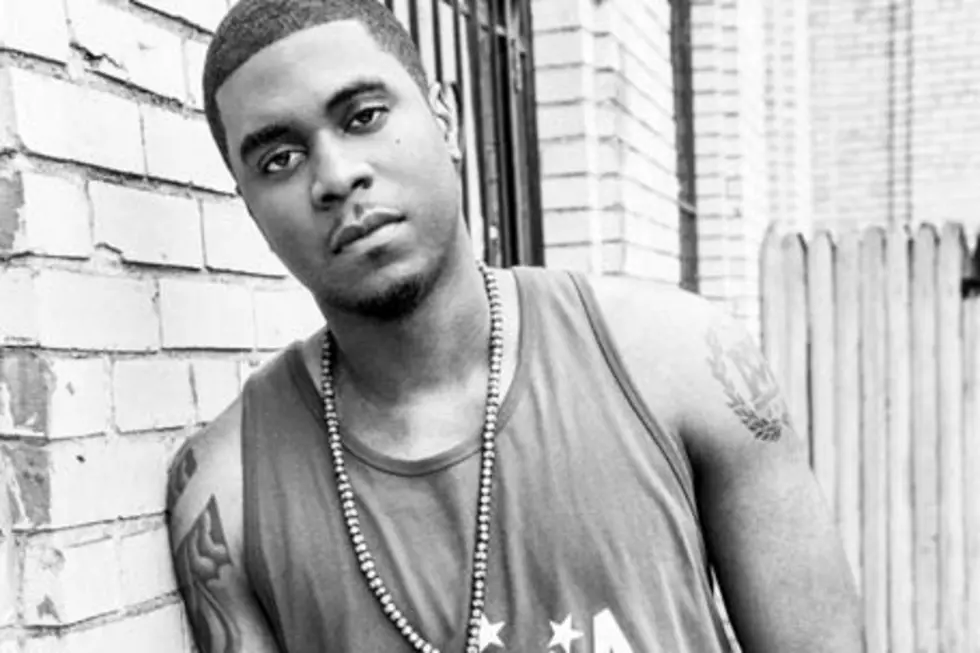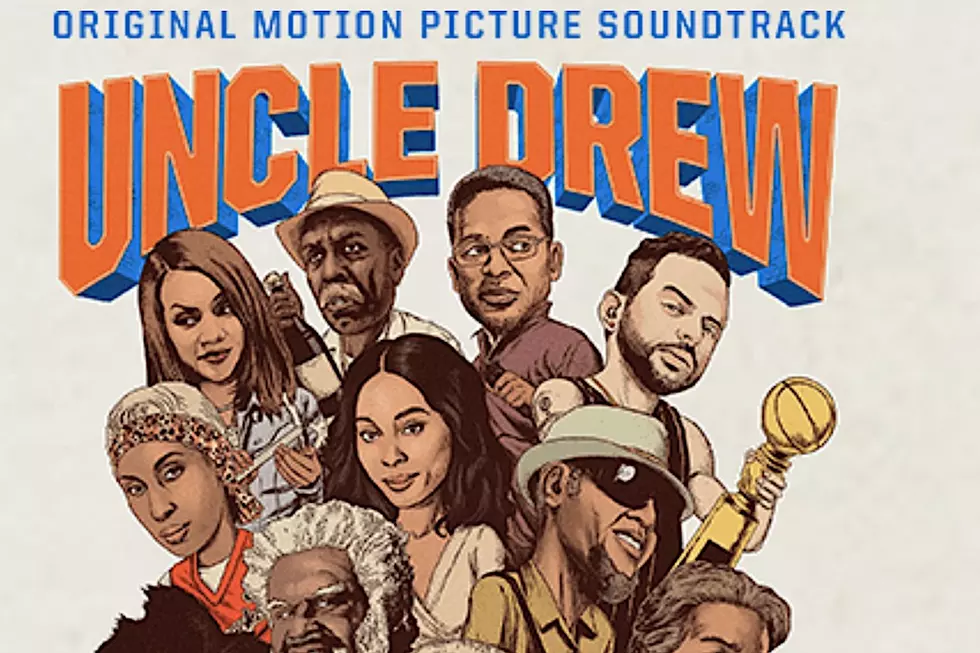
Big K.R.I.T. Talks Debut Album, Zombie Movement, Career Lessons From 8Ball & MJG
Big K.R.I.T. has been dreaming of the release of his first album, Live From the Underground, which dropped this week, since he was a 13-year-old growing up in Meridian, Miss. But the rapper and producer never thought his debut would be graced with legendary collaborations from artists who define his bluesy and gritty sound -- B.B. King among them, whom he was introduced to by his grandmother, as well as 8Ball and MJG, a duo his older cousins would keep in rotation.
With 16 tracks to spin, K.R.I.T. provides much of the same formula that gave him mixtape king status with Krit Wuz Here, Return of 4Eva and most recently, 4Eva N Day. This album offers more live instrumentation, more notable collaborations from artists like Ludacris and Melanie Fiona and more in-depth storytelling. The MC stays true to his roots and doesn't switch up the sound he believes stands alone from much of mainstream hip-hop.
Currently, K.R.I.T. is readying his Live From the Underground tour beginning in July, with L.A.'s own young charismatic rhymer Casey Veggies as an opener. While promoting his new album in the city that never sleeps, The BoomBox stopped by the Def Jam office to speak with K.R.I.T. about teaming up with B.B. King, the vinyl record he's proud to own, the gifted hands behind his album artwork and Mississippi-dedicated tattoo and his thoughts on the so-called "zombie takeover."
Why did you decide on the name Live From the Underground?
Primarily, because I feel like I still have the same hunger and passion when I first started doing music. Also the kind of music that I've been creating, the soul and the feel, sometimes it's from a totally different planet, when you think of mainstream music, and for me, it's just about bringing that sound and that quality to a realm that where you consider it mainstream, and you can decide whether you like it or not. It's primarily surrounded around keeping that same grit and that same feel I had when I first started making music.
What did you want to do differently with an album, that you didn't do on your mixtapes?
One, on a production level, the production had to be bigger in my mind. Really figure out a way to make records that sound like samples but weren't. Creative mind-frame level. Try to dive deeper into myself as far as coming up with records and content that I never rapped about before also take from Krit Wuz Here, 4Eva N A Day and all of the things people liked about those and put it on one album, within 16 records. It's not like a mixtape, where you have like 20-something records.
Unlike your mixtapes, you have many collaborations. With "Money on the Floor" you collaborated with 8Ball and MJG and also 2 Chainz? How was it working with both of them especially 8Ball and MJG since I'm sure you grew up listening to them?
Man, it was crazy. For one these legends, these O.G.s, they're workaholics, and they're thorough with their work ethic. So as soon as I sent them the record, I got their verses back immediately from 8Ball and MJG. And it's crazy because I've been talking about doing a song with them forever and working with them, and I had an opportunity to get them on my first single and this album. And I had an opportunity to feature 2 Chainz, because 2 Chainz reached out and looked out for me on record called "Pimps" that was on Codeine Cowboy also featuring Bun B as well. That was before a lot of this was popping off for me, and so it's just me showing love and it was just me really representing what southern hip-hop sounded like to really feature two legends and an up-and-coming O.G. as well.
The same people they are in the music, is the same people they are in person. And it's always great to get around these O.G.s and they get you game on how to make sure to take care of your business, or always staying on the road, because they're definitely one of those artists that always stayed on the road. And no matter what, do what feels good to you. And just looking at their career and seeing that it worked for them, it just makes sense to make the kind of music that works for me, that I believe in when I'm onstage. It's gon' show whether I love this song or not.
You also worked with B.B. King on "Praying Man. " Tell me about that experience.
Man, working with B.B. King is crazy because when we were talking about doing the actual record, I never thought that it would actually happen. We laughed about it and kept it moving, but it actually panned out. I remember walking in the studio and he was just sitting there drinking a Diet Coke, just chilling and he was cool. He was telling us about touring life, performing at the Grammys and he was telling us about Eric Clapton, and asked me if I wanted him to play the guitar on the record and just going over the lyrics and even being like, "Yo, I like this song." Coming from him that means so much. He got it in and played the guitar and y'all gonna see some of the footage from that. He was super humble. He's definitely the kind of person, he doesn't have to be humble.
Are you a praying man?
I'm definitely a God-fearing man. I'm definitely a praying man. The song in particular for me is special because it's telling three different stories from three different perspectives of slavery. So the first verse is about somebody that's hanging in the tree; someone that's already been lynched. The second verse is about a slave that jumped off the boat and the third verse is about somebody running from a lynch mob. The thing about the record is that all three of these people are dead and the praying man is coming to take them away from the situation. So when you listen to the record, you can kind of hear the atmosphere aspects, the wind blowing in the first verse, the water splashing in the second verse, the dogs and the horses, you can hear just all that happening in the third verse.
So why do you tell those types of stories?
I mean, being from Mississippi, I feel like it's something that happened just in history. Slavery hasn't gone away. I feel like it's a topic that can still be touched on. Not to say that hip-hop forgot about it, it's just me being where I'm from. I have such a strong platform to talk about it. My grandmother told me about stories that her grandmother went through and as far as civil rights and that a lot of people died for me in order to have the opportunity that I have now. So why not make a song about that.
And speaking of Mississippi, I see you have a tattoo dedicated to the state you're from. Do you have others?
I got a lot now. I got my label on one of my arms, I got "King Remembered In Time" on my back with the crown. And Miya Bailey tatted up my whole right arm, and it's really my ado to Mississippi and I asked him to do a mural of how he felt about Mississippi. It's a lot going on, just the pain and the struggle of it all.
How do you decide on your album art, because the last two mixtapes, as well as the current release Live From the Underground, kind of has a similar feel to it as far as the elements present. How did you decide on that?
Well, first and foremost, shout out to Eric Bailey for doing the artwork for the projects and you know it's just one of those things. Even with Return of 4 Eva, it was a huge collage of all the things I love in my life. The two doves in honor of both my grandmothers that passed, the vinyl records, I love Hennessy, and the woman in the Hennessy glass, the Africa sign.
The 4Eva in N Day cover was based on the things I battled with in life; the good and the bad, the right and the wrong and all the things you really love to do that are wrong for you or aren't good for you. So that's why you have the church on the left, the juke joint and the strip joint on your right, and the bottle of Hennessy and the bible. A lot of people look at the cover and say the child's head is pointed towards the strip club. But in my mind I wanted the cover like it was moving and in life you look from the left to the right. So that's why his head's to the right because he's already looked over there [left] and made his way over there [right].
And the Live From the Underground cover is me saying again, I feel like the underground can sometime be a totally different planet from mainstream and it kind of crash landed into this industry where you either got to be one way, or it's like it me like telling my story.
Cars are especially ever-present. Are you a car addict?
I love cars. I have a Monte Carlo 1986, European grill and I'm getting that done up right now. I'm really a Monte Carlo head. The first car I ever bought was Monte Carlo, and that was in 2007 [or] 2008. It has some sort of sentimental value to me.
Since sampling is big for you, I'm sure you're big on collecting. What's a record that you have in your position that you're super proud to have?
Aww man, I have Willie Hutch "The Mack." I have Bobby Womack "Across 110th Street" single vinyl, which is probably one of my favorite songs of all time.
OK, fun question away from the music, more current events. What do you think about the so-called "zombie movement"? Do you think it's fictional or real?
Zombie movements in horror movies are fictional. I would say that these people aren't zombies because the zombies I know bite you and then you become a zombie. So they're just eating people and that's it. I will say that whatever the epidemic is and whatever that's causing this, I pray to God that people don't try this sh*t anyway. Like you see all the reactions from all the people that's doing this, I would hope people wouldn't try it to see what happens. I just stayed prayed up.
See 15 New Albums Debuting This Summer
%VIRTUAL-MultiGallery-156181|154727|149066%
More From TheBoombox







![Kid Cudi, Wiz Khalifa and More to Headline 2018 Smokers Club Fest [PHOTO]](http://townsquare.media/site/625/files/2018/02/Kid-Cudi-Wiz-Khalifa-Smokers-Club-Fest.jpg?w=980&q=75)
![2 Chainz Announces New Album ‘Rap or Go to the League’ [VIDEO]](http://townsquare.media/site/625/files/2018/02/2-Chainz-Announces-New-Album.jpg?w=980&q=75)
